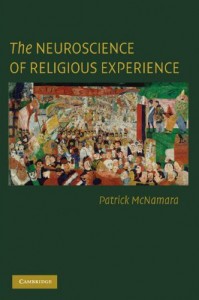The Neuroscience of Religious Experience
The Neuroscience of Religious Experience is available to purchase through Cambridge University Press. Click here for more details. We also include some reviews of the book and the table of contents below.
Reviews of The Neuroscience of Religious Experience:
“Patrick McNamara shows the power of the neurosciences, evolutionary biology, and cognitive sciences to cast important new light on religion through a wide range of religious phenomena, interpreted with sympathetic objectivity and reserve. No scholar of religion, from any of the disciplines of religious studies, should ignore this accessible but scientifically detailed tour de force of creative analysis.”
Robert Cummings Neville
Boston University, Past President of the American Academy of Religion
“An authoritative and up-to-date resource on the neurobiology of the human spirit. McNamara has led the way in developing the new science of the biology of religion, a field that blends evolutionary biology with cultural anthropology, religious studies, neurocognition and neurochemistry. Scientists, clinicians, religious scholars, and the public will all profit from the cutting-edge findings contained within. McNamara does not commit the error of reducing religion to “nothing-but” brain processes, but rather does justice to the richness and complexity of the human spirit. If you read one book on religion and the brain, it should be this one.”
Robert A. Emmons
University of California, Davis
“The Neuroscience of Religious Experience is a stunning achievement and is essential reading for anyone interested in the scientific study of religion. Not only does it offer the most comprehensive synthesis of neurological, biological, and cognitive research on religion to date, but McNamara provides us with a novel and compelling theory that can make sense of this massive literature. McNamara tackles challenging questions with clarity, fresh insight, and uncompromising rigor. His broad interdisciplinary approach will be welcomed by all scholars. McNamara shows great respect for his subject and he is a worthy heir to William James.”
Richard Sosis
University of Connecticut
“An excellent treatise on the relationship between the self, the brain, and religion. Clear, well written, and highly engaging. Necessary reading for anyone interested in the field of science and religion.”
Andrew Newberg
University of Pennsylvania
“Dr. McNamara has provided the clearest account yet of the underlying neurological circuits and chemistry that are bound with religious experiences. Yet he has moved the field of neurotheology forwards by uniting this with an understanding of the neuroanatomy of the sense of self. He explains how religion itself has been a driving force for the development of human consciousness, which is a fascinating hypothesis.”
Michael Trimble
UCL Institute of Neurology
“McNamara’s book is must reading for everyone interested in the dialogue between religion and brain science.”
Ilkka Pyysiäinen
Helsinki Collegium for Advanced Studies
Table of Contents for “The Neuroscience of Religious Experience”
| Preface |
| Acknowledgments |
| Chapter 1: God and the Self |
| Chapter 2: On the Self and the Divided Self |
| Chapter 3: Mechanisms and Dynamics of Decentering |
| Chapter 4: Neurology of the Self |
| Chapter 5: Neurology of Religious Experiences |
| Chapter 6: Neurochemistry of Religiosity |
| Chapter 7: Self-Transformation as a Key Function of Performance of Religious Practices |
| Chapter 8: Self-Transformation through Spirit Possession |
| Chapter 9: God Concepts |
| Chapter 10: Religious Language |
| Chapter 11: Ritual |
| Chapter 12: Life-Span Development of Religiosity and the Self |
| Chapter 13: The Evolution of Self and Religion | References |
| Index |


